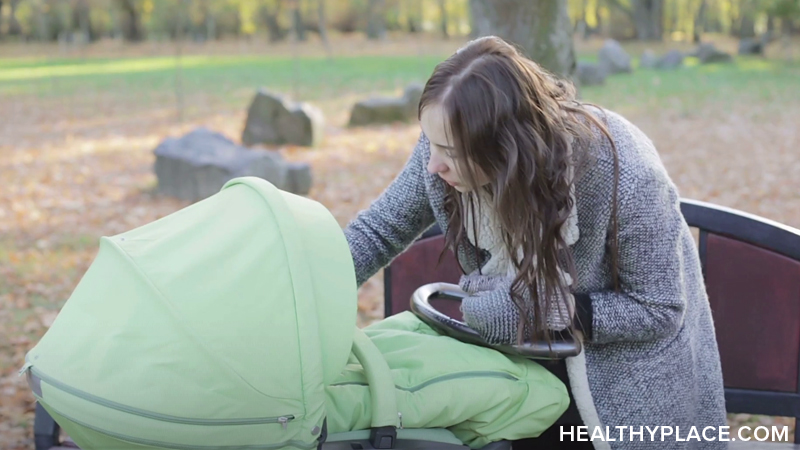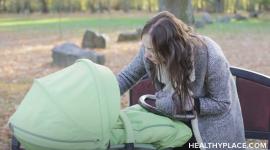Are There Natural Treatments for Postpartum Depression?

Several different natural treatments for postpartum depression (PPD) exist. Studies into the efficacy and safety of natural treatments, often classified as complementary alternative medicines (CAMs), have been ongoing. Some natural treatments have been found to be both effective and safe in treating PPD; however, others are questionable in their safety for both mothers and infants. An important caveat with any natural treatment is that caution is needed. Consult with your doctor and other healthcare professionals to verify that any natural treatments for postpartum depression are safe.
Why Some Women Want Natural Treatments for Postpartum Depression
Just as some natural treatments are effective and safe, some traditional medications (such as Zulresso) are effective and safe, too. Also like CAM, some traditional medications have undesirable side-effects. Some women who have recently given birth and are dealing with PPD are concerned about taking medication. When a new mother is already struggling with PPD or postpartum anxiety, adding the extra concern about prescription medication can exacerbate her symptoms.
Another worry among mothers with PPD is that even if a medication is proven to be safe, it might fall short. Prescription medications often have a narrow target like improving the levels and behavior of neurotransmitters in the brain known to be involved in PPD. While that’s a step in the right direction, there’s concern that this might not be enough. Prescription medications often fail to address factors that impact PPD such as:
- Inflammation
- Nutrition deficiencies
- Exposure to toxins
With the above caveat in mind, that not every natural treatment for postpartum depression may be safe, know that according to University Health News, a group that provides expert health advice from top universities and medical centers, natural treatment of PPD is often considered to be safe and effective.
With information about safety and effectiveness in mind, let’s turn to types of natural treatments, including lifestyle, nutrition, and other treatment approaches.
Postpartum Depression Natural Treatment: Lifestyle
How you live your life from the moment your baby is born can have a big impact on postpartum. Many factors are at work in the development of PPD, and lifestyle may or may not prevent it. If you are already experiencing it, certain lifestyle changes can make a positive impact on how you feel.
Lifestyle can involve actions you take. These are particularly helpful in reducing postpartum depression:
- Regular exercise (mild in the early weeks after giving birth—the goal is to stay moving)
- Walking your baby as a form of exercise and bonding
- Get together with other people to remain connected and supported
- Reach out for help (PPD support groups allow you to gain new insights as well as share your own insights with others)
- Take time for yourself to do something you enjoy.
- Set realistic goals every day. Allow yourself to get less done than before the baby came. After all, caring for your baby is more important than doing the dishes.
- Go to therapy. Seeing a therapist is a natural remedy that allows you to sort things out.
Postpartum depression can make it feel difficult to take on any of these lifestyle measures. Know that you don’t have to feel great in order to start these activities. Often, the activities come first and PPD improvement follows.
Treating Postpartum Depression Naturally with Nutrition
Both our physical health and our mental health is greatly influenced by what we eat. Ensuring that you get enough nutrients is important in easing postpartum depression. Some that have been found to be particularly beneficial after childbirth include, but aren’t limited to:
- Omega-3 fatty acids
- B vitamins, especially vitamins B6 (riboflavin) and B12 (folate)
- SAMe (a molecule found naturally in the body that is also produced as a supplement)
The herbal supplement St. John’s Wort has been known to help depression. However, professional opinions are mixed on its safety for breastfeeding moms. It’s imperative to talk to your doctor before taking SAMe or any other supplement, especially if you’re nursing (Postpartum Depression and Breastfeeding: Effects, Safe Treatments).
Other Natural Treatments for Postpartum Depression
In addition to lifestyle and nutrition, you can help overcome PPD in a variety of other ways.
One popular and effective natural treatment for postpartum depression is bright light therapy. It’s safe and easy to use. Sitting in front of a light box for as little as a half hour per day can stimulate your brain in ways that reduce depression. It’s safe for you and your nursing baby, too (but don’t put your baby in front of the light).
Massage is a relaxing form of self-care. Touch has been shown to improve mood and reduce stress. Plus the act of treating yourself sends the message that you’re worth this.
Aromatherapy using essential oils can improve mood, energize, and calm. In postpartum depression, use of essential oils can reduce symptoms, improve your daily life, and boost your overall quality of life—without the use of prescription medication. You can dilute oils in a carrier oil and massage into your body with your hands or a roll-on bottle. Add drops to a diffuser and breathe them in while doing something relaxing, and add drops to a bath. Among the oils that have been found to positively and safely impact PPD are
- Angelica
- Bergamot
- Frankincense
- Geranium
- Grapefruit
- Helichrysum (immortelle)
- Lavender
- Lemon
- Mandarin
- Neroli
- Nutmeg
- Rose
- Tea tree
- Vanilla
- Ylang ylang
Like medications and herbal supplements, essential oils can pass through breastmilk and harm the baby. Oils to avoid:
- Aniseed
- Camphor
- Parsley Seed
- Tarragon
- Wintergreen
Finally, some women turn to their own body as the ultimate natural PPD healer by using hormones as treatments. After childbirth, hormones drop drastically. Estrogen patches can help raise levels of this hormone, which in turn helps regulate mood. If you decide to use this method, you’ll have to see your doctor. Make sure to let her know if you are breastfeeding, so you both can assess the safety of hormone therapy.
Numerous natural treatments for postpartum depression are available to help you recover and enjoy motherhood. They can be a drug-free way to overcome depression, but some things aren’t safe for a nursing baby. Working with your healthcare professional will allow you to discover and use an approach that is the safest and most effective for you and your infant.
APA Reference
Peterson, T.
(2022, January 3). Are There Natural Treatments for Postpartum Depression?, HealthyPlace. Retrieved
on 2025, November 27 from https://www.healthyplace.com/depression/postpartum-depression/are-there-natural-treatments-for-postpartum-depression


